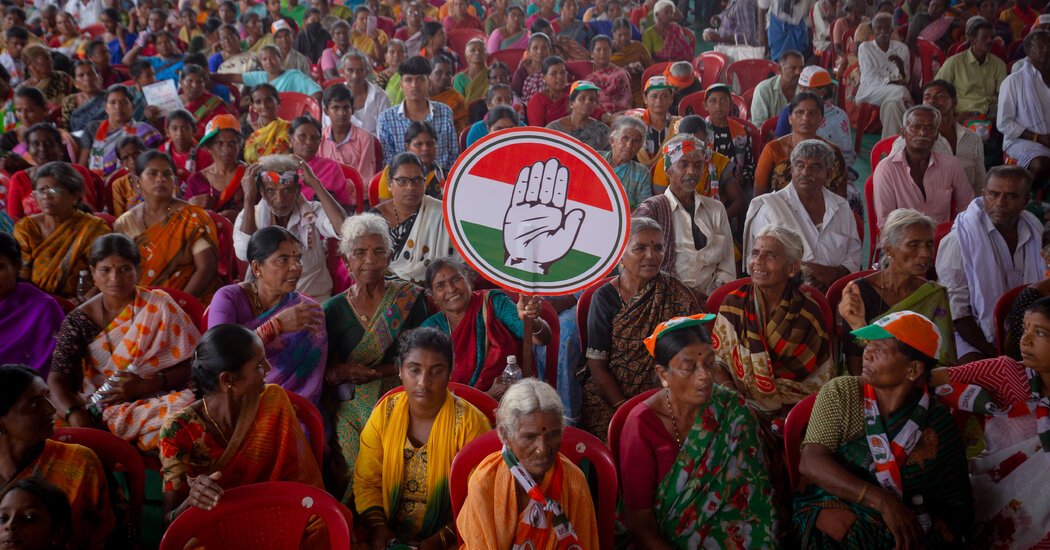The last time Indians voted in a national election was in 2019, when the Bharatiya Janata Party led by Prime Minister Narendra Modi narrowly won. But even then, more than 60 percent of voters voted for other parties.
That Mr. Modi has achieved such dominance in Parliament despite falling far short of majority popular support is a reflection of a dysfunctional and fragmented political opposition.
The main opposition party, the Indian National Congress, ruled for decades after the country’s independence in 1947 under the leadership of the Nehru-Gandhi dynasty. The party’s reputation has now fallen significantly: in 2019, it won 52 seats in parliament, while the BJP had 303 seats. She is not expected to do much better in this year’s election, which began on Friday and lasts six weeks.
This is why India’s political opposition is in such a difficult position.
Congress is a shell of what it once was.
The Congress, long positioned at India’s political center, has struggled to find direction and offer an ideological alternative to the Hindu nationalist BJP. That has slowed the broader opposition’s fight against Mr. Modi.
The Congress faced a leadership crisis, a series of rebellions and infighting. Even after two consecutive defeats at the hands of Mr Modi, the party has remained loyal to its dynastic leadership. She has again suggested Rahul Gandhi, the son, grandson and great-grandson of Indian prime ministers, as her face in the fight against Mr. Modi.
Mr. Gandhi has sought to increase his political clout by leading long marches across the country, including one of more than 100,000 marches 2,000 miles. But when he seemed to gain momentum, the BJP tried to stop it.
After his first march, which drew large crowds, the BJP involved him in a court case that led to his own Expulsion from Parliament. He was later returned to his seat by India’s highest court.
His party’s defeats in several key state elections in recent months have also thrown it off track and exposed the extent of its deep-rooted problems.
A coalition of parties has difficulty uniting.
In the months before the election, various opposition parties formed an alliance with the catchy name INDIA, short for the less euphonious Indian National Developmental Inclusive Alliance.
The coalition’s formation left BJP leaders uneasy, suggesting the election could be less lopsided.
But a series of bitter disagreements over seat distribution among alliance members has disappointed many supporters. In some states, coalition parties failed to resolve long-standing differences and prioritized protecting local turf over the national ambition to challenge Mr. Modi.
The chief minister of a state, who was one of the founders and prominent representatives of the opposition bloc, even switched sides to join the BJP. Modi tried tirelessly to divide the coalition, luring some members with incentives and trapping others with investigations and prison sentences.
Modi is using the government to persecute opponents.
Opposition groups say Mr Modi is letting government agencies do his political work for him. They appear to have good reason: Opposition leaders have been the target of about 90 percent of cases against politicians prosecuted by the country’s top financial crime agency since Mr. Modi came to power in 2014.
Weeks before this year’s election, tax authorities under Mr Modi decided to freeze the Congress’ bank accounts, paralyzing the party. The Modi government has also sent two prime ministers from opposition parties to prison.
While the Congress has long been the subject of Mr Modi’s ire – he has even declared that he wants a “Congress-free India” – a smaller organization, the Aam Aadmi Party (AAP), has been particularly cracked down on.
Mr Modi sees the AAP as a potential national challenger as the Congress fades, analysts said. The party leads governments in the Delhi capital region and the state of Punjab and has made inroads into Modi’s home state of Gujarat.
The opposition’s lines of attack have limited appeal.
The opposition coalition has pursued Mr. Modi on two main issues: rising authoritarianism, they say, is transforming India’s democracy into one-party rule, and political corruption, they say, enriches a small elite.
Opposition leaders have also pointed to growing inequality and the huge lack of jobs in India, particularly among the large number of young people.
It is unclear whether these lines of attack have done much damage to Mr Modi’s reputation. He has achieved great power and popularity through a potent mix of Hindu majoritarianism, robust social programs and his own personal charisma.
Mr Modi also has enormous control over India’s information channels, with the broadcast media particularly attuned to his wishes.
Mujib Mashal contributed to reporting.
